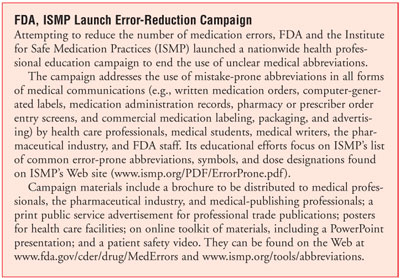US Pharm.
2006;7:72.
Tysabri Marketing Allowed
to Resume
The Biogen-Idec
drug Tysabri (natalizumab) may be marketed subject to a special restricted
distribution program, FDA announced in June. The monoclonal antibody used to
reduce flare-ups in patients with relapsing forms of multiple sclerosis (MS)
was withdrawn from the market in February 2005, three months after its
approval, after three patients in the drug's clinical trials developed
progressive multifocal leukoencephalopathy (PML).
To reduce the risk of future patients developing the serious and rare viral
infection of the brain, patients who take Tysabri must comply with a mandatory
patient registration requirement and undergo periodic follow-up designed to
identify PML cases as early as possible. To facilitate this, Biogen-Idec
created a risk management plan called the TOUCH Prescribing Program.
Because FDA does not know enough about how Tysabri's use with other
immune-modifying drugs could affect PML risk, Tysabri is indicated for use as
monotherapy or for patients who have not responded adequately to or cannot
tolerate other MS treatments.

FDA Strengthens Counterfeit Drug
Fight
Aiming to ensure
the safety of the U.S. drug supply, FDA recently announced new measures
designed to protect against counterfeit drugs. The measures, described in a
report released by FDA's Counterfeit Drug Task Force, emphasize certain
regulatory actions and the use of new technologies.
Specifically, FDA will fully implement regulations related to the Prescription
Drug Marketing Act of 1987, which requires drug distributors to provide
documentation on a drug's "pedigree." The agency also encourages distributors
to adopt radio-frequency identification technology, particularly for products
most susceptible to counterfeiting and diversion. FDA's report is available at
www.fda.gov/counterfeit.
FDA/EPA Seafood Advisory Still
Current
FDA and the
Environmental Protection Agency (EPA) recently assured consumers that its 2004
advisory "What You Need to Know About Mercury in Fish and Shellfish" remains
current and that they stand by the advice contained in it. The advisory
provides information on safe consumption of fish and shellfish for women who
might become pregnant, who are pregnant, or who are nursing, as well as for
young children.
Since fish and shellfish are
an important part of a healthy diet, FDA and EPA recommend that women and
young children include them regularly in their diet. However, to reduce
exposure to mercury, the agencies recommend that women and young children
abide by the following guidelines:
1. Do not eat shark,
swordfish, king mackerel, or tilefish, as they have high mercury levels;
2. Eat up to 12 ounces
per week of fish and shellfish that are lower in mercury (e.g., shrimp, canned
light tuna, salmon, pollock, catfish), with only 6 ounces comprising albacore
tuna; and
3. Check local
advisories about the safety of fish caught in local waters. If no information
is available, eat up to 6 ounces of such fish per week and do not consume any
other fish during that week.
To comment on this article, contact editor@uspharmacist.com.






